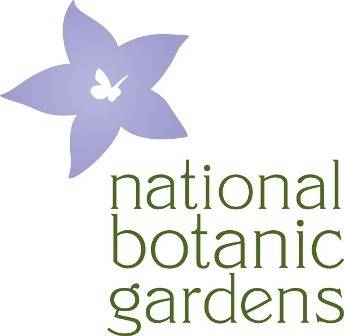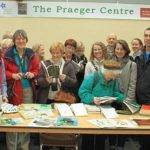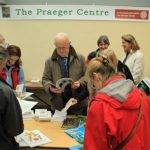The Praeger Centre was launched at the National Botanic Gardens on Saturday morning during a visit by the Dublin Naturalists Field Club (DNFC), along with representatives of the Belfast Naturalists Field Club (BNFC).
 The Garden’s Director, Dr Matthew Jebb, welcomed the two field clubs and pointed out how fitting it was that Praeger, who had been President of both Clubs in his day and who had organised joint outings of the field clubs, should be the inspiration behind the need for a Field Study Centre at the National Botanic Gardens. Matthew Jebb thanked the Heritage Council for a generous grant that had enabled the purchase of eight binocular microscopes, an entomological cabinet and the provision of a library in the form of the complete publications of the Field Studies Council. The concept at the heart of the Praeger Centre is that the more people learn about the flora and fauna of Ireland, the more they can appreciate and protect its diversity and beauty for future generations.
The Garden’s Director, Dr Matthew Jebb, welcomed the two field clubs and pointed out how fitting it was that Praeger, who had been President of both Clubs in his day and who had organised joint outings of the field clubs, should be the inspiration behind the need for a Field Study Centre at the National Botanic Gardens. Matthew Jebb thanked the Heritage Council for a generous grant that had enabled the purchase of eight binocular microscopes, an entomological cabinet and the provision of a library in the form of the complete publications of the Field Studies Council. The concept at the heart of the Praeger Centre is that the more people learn about the flora and fauna of Ireland, the more they can appreciate and protect its diversity and beauty for future generations.
This being the 125th Anniversary year of the DNFC it was a historic moment, and an opportunity to take the long standing links with the Field Club and the National Botanic Gardens to a new level. Matthew Jebb invited the DNFC to make use of the equipment and literature in their programme of events for 2012. DNFC’s current President, Katharine Duff, and Secretary, Gerry Sharkey, were both present at the launch and intend to plan a programme to make full use of the Centre.
Ultimately the Praeger Centre will fulfil the need for a dedicated suite of classroom-laboratories with equipment and literature to provide the facilities needed for examination of field-collected materials, to host training days and classes and support natural history clubs and societies by providing an indoor space for their own meetings and training events.
The parkland habitats, river Tolka and pond at the National Botanic Gardens are an excellent source of materials, especially of plant and invertebrate communities, to provide subject matter for users of the Centre.
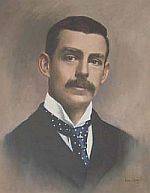 Robert Lloyd Praeger was born in 1865 in Holywood, Co. Down, An engineer by qualification, a librarian by profession and a naturalist by inclination, Praeger’s appointment as assistant librarian at the National Library of Ireland in 1893 brought him to Dublin, where he became the focus of a remarkable high point in natural history studies. He organised the Lambay Survey in 1905, which led to the famous Clare Island Survey of 1909 to 1912. He was one of the most prolific writers Ireland has ever seen, with 800 publications, as well as co-founding and editing the journal, the Irish Naturalist. He was awarded the Royal Horticultural Society’s gold medal on two occasions and later became its president. He was elected President of the Royal Irish Academy, the British Ecological Society, the Royal Zoological Society of Ireland, the Geographical Society of Ireland and the Bibliographical Society of Ireland, as well as founding Presidents of both the Library Association of Ireland and an Taisce. He received honorary doctorates from Queen’s College Belfast, Trinity College Dublin, and the National University of Ireland.
Robert Lloyd Praeger was born in 1865 in Holywood, Co. Down, An engineer by qualification, a librarian by profession and a naturalist by inclination, Praeger’s appointment as assistant librarian at the National Library of Ireland in 1893 brought him to Dublin, where he became the focus of a remarkable high point in natural history studies. He organised the Lambay Survey in 1905, which led to the famous Clare Island Survey of 1909 to 1912. He was one of the most prolific writers Ireland has ever seen, with 800 publications, as well as co-founding and editing the journal, the Irish Naturalist. He was awarded the Royal Horticultural Society’s gold medal on two occasions and later became its president. He was elected President of the Royal Irish Academy, the British Ecological Society, the Royal Zoological Society of Ireland, the Geographical Society of Ireland and the Bibliographical Society of Ireland, as well as founding Presidents of both the Library Association of Ireland and an Taisce. He received honorary doctorates from Queen’s College Belfast, Trinity College Dublin, and the National University of Ireland.
In a life that spanned eighty years, Praeger influenced many people during an age of discovery and enlightenment about Ireland’s natural history and landscape. Praeger gave voice to a profound respect for the beauty of the natural world. His field skills and writings, extolling the virtues of tramping through the Irish countryside, make it more than appropriate that his name should be associated with what the National Botanic Gardens hopes will become a focus for renewed interest in Natural History. The Dublin Naturalists’ Field Club has been in existence for 125 years, and for much of that time has lacked a head quarters at which it could house it’s library, and conduct indoor identification workshops. Each year it holds about 50 outdoor field excursions, and the Director hoped that the Praeger centre will provide their members, along with other natural historians, with the opportunity to develop a greater depth of knowledge and skills.
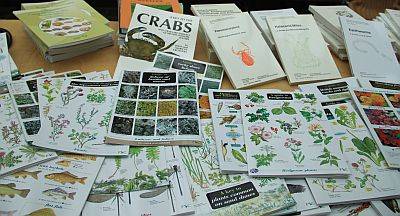
The Field Studies Council (FSC) is a UK-based educational charity committed to environmental training and understanding. Established in 1943, the FSC has a network of 17 education centres, which run numerous training courses each year for children and adults from amateur to professional. The Field Studies Council has just a single field centre in Northern Ireland, at Derrygonnelly in Fermanagh. The Praeger Centre will provide an urban field studies centre in the heart of Dublin.
In addition the FSC has a publication service that has produced a series of guides for identification of the fauna and flora of these islands. These range from fold-out charts to detailed monographs. The Heritage Council grant has enabled us to buy the complete set of their literature.
| FOLD OUT CHARTS
Birds of prey |
AIDGAP guides
Beetle families key Synopses of British Fauna British anthozoa |
Royal Entomological Society Handbooks
Aphids – Aphidinae Secondary Science Publications Coral reefs: ecosystems in crisis BRC Atlases |
